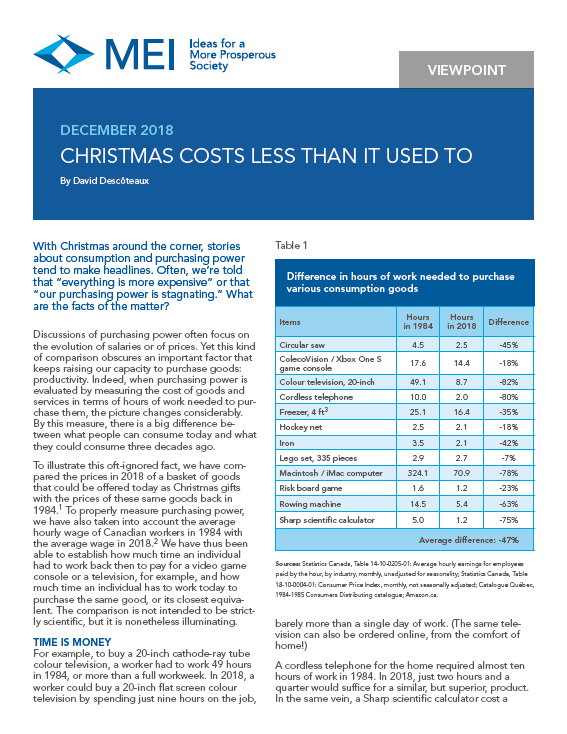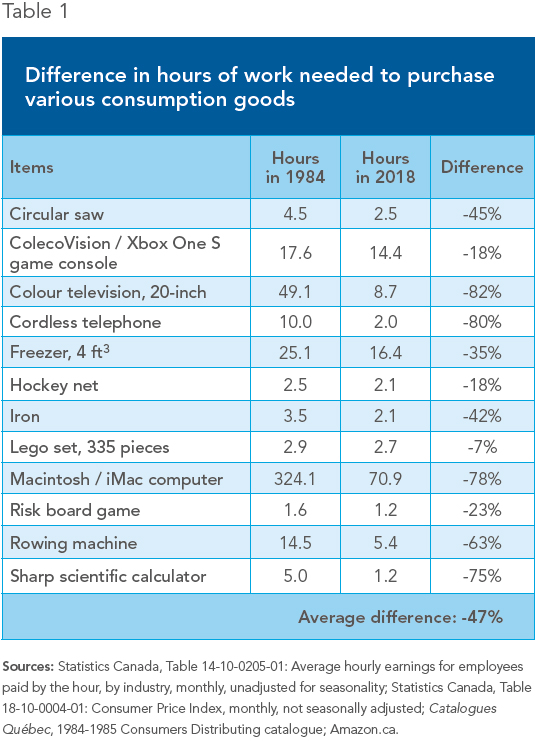Christmas is less expensive than it was in the good ol’ days

Montreal, December 21, 2018 – We often have the impression that life just gets more and more expensive, but the picture changes considerably when we look instead at our ability to purchase goods. Thus, the goods in a “Christmas basket” cost about half as much today as they did in 1984 when their cost is measured in hours of work, shows a publication launched today by the MEI.
“For example, to buy a 20-inch cathode-ray tube colour television, a worker had to work 49 hours in 1984, or more than a full workweek. In 2018, a worker could buy a 20-inch flat screen colour television by spending just nine hours on the job, barely more than a single day of work,” notes David Descôteaux, Public Policy Analyst at the MEI and author of the publication.
The author also gives the example of a cordless telephone for the home, which required almost ten hours of work in 1984. Yet in 2018, just two hours and a quarter would suffice for a similar, but superior, product.
“Even for consumption goods without a significant technological component, today’s shopper stands to save, if somewhat less spectacularly. For instance, the hours of work needed to buy a circular saw (4.5 hours in 1984 versus 2.5 hours in 2018) or an iron (3.5 hours in 1984 versus 2 hours in 2018) have also fallen,” adds the author.
By reconstructing a basket of goods that could be found underneath a family’s Christmas tree, we can see that the goods in the 2018 basket cost around half of what those from 1984 cost, measured in hours of work—the average difference being 47% (see table below).
“Investments on the part of businesses and technological innovation have led to large increases in the productivity of both machines and workers. The growth in the knowledge and skills that workers have acquired through education has raised the value of work, and as a result, the average wage,” explains the author.
“We often have the impression that the average worker has trouble making ends meet, and this is true in some regards: The price of housing, for example, can be a challenge in certain cities. Yet in many regards, thanks to an economic environment that is favourable to trade and investment, this worker has never been richer,” concludes David Descôteaux.

The Viewpoint entitled “Christmas Costs Less Than It Used To” was prepared by David Descôteaux, Editor and Public Policy Analyst at the MEI. This publication is available on our website.
* * *
The MEI is an independent public policy think tank. Through its publications and media appearances, the MEI stimulates debate on public policies in Quebec and across Canada by proposing reforms based on market principles and entrepreneurship.
-30-
Interview requests: Pascale Déry, Vice President, Communications and Development, MEI. Tel.: 514-273-0969 ext. 2233 / Cell: 514-502-6757 / E-mail: pdery@iedm.org

